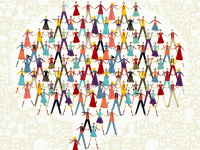Transforming Education: The One Thing I’d Change in 2014
Your content has been saved!
Go to My Saved Content.In order to work for change in our schools, we must visualize the changes we want to see. In 2014, the change I'd like to see is in how we talk and listen to each other, how all of us -- teachers, administrators, students, parents, staff -- talk and listen to each other. This single change, I do believe, would be transformational.
It would lead to stronger, healthier, more resilient communities that would be capable of tackling the challenges facing our schools and world.
Of this I am certain: We cannot transform our schools alone; we can only do so in teams and communities. Teams and communities are built through dialogue. Our relationships are knit together with words, and yet, so many of us working in schools struggle with this skill. It's not something we've ever been taught and we rarely are given opportunities to practice. It's simply not valued as a core capacity.
Understanding One Another
If I had a magic wand, I'd make 2014 the year we learn to talk to each other. I wouldn't create goals or objectives for this initiative, but I would prioritize it in classrooms, staff rooms, professional development calendars, report card conferences, and so on.
I wouldn't gather data on it and look for benchmarks or hold people accountable for learning to communicate, but I would ask, towards the end of the first year, if people feel closer to each other, if they feel cared for, if they feel more understood than they were a year ago.
I'd ask this of parents, children, custodians, cafeteria workers, teachers, coaches, curriculum specialists, superintendents, deans, principals, and so on. I'd ask: Who do you feel listened to you well this year? Who asked you a question that deepened your thinking? Who did you learn something about this year? What new understandings of someone else did you arrive at this year? Who do you feel understood you better this year?
Listening leads to understanding. There's an understanding deficit in our education world.
We'd start by slowing down, by creating time for conversations, for listening. We'd learn some skills, skills we never teach in school, but essential ones for all. We'd learn how to:
- Use active listening to ensure that you've accurately heard someone else and to help another deepen his or her own thoughts
- Disagree with each other and how to have productive, healthy conflict. We'd learn how to make decisions together
- Distinguish decisions which must be made by someone
- Formulate questions when we don't understand
- Respond to questions from someone who doesn't understand
The Art of Inquiry
Parents would come into a parent-teacher conference, or to Back to School Night, and they would be asked, "What do you appreciate about your child? What are you most concerned about? How could we work together to support your child? What do you want me to know about your child?" The parents would talk. The teacher would listen.
At the start of the school year, a principal would ask a teacher: "What do you want me to know about who you are? What is the one thing you'd like to change in our school this year? Who would you like to be for your students? How can I help you meet the needs of all of your students? What do you need from me?"
Learning to listen doesn't mean that we stop all other work. It doesn't mean that the principal ceases to lead from a collaboratively built, living vision; it doesn't mean that teachers stop offering challenging texts or allow their classrooms to become unruly. It would mean that we'd pay much more attention to how we communicate with each other, to how we listen to each other.
Authentic dialogue could lead to stronger communities, to deeper understandings across difference, and to finding creative solutions to the problems that exist in our schools and country. That's my hope for 2014: that we learn how to slow down, listen, and effectively communicate with each other.
Share with us your hopes and aspirations for the new year in the comment section below.
